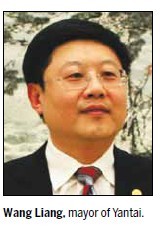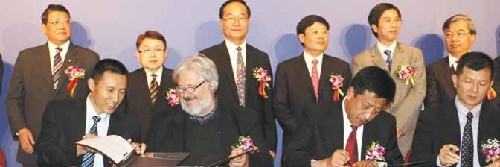Your are Here :Home> News>Biz Updates
Yantai seeks closer ties with HK businesses
Updated : 2013-05-30
(China Daily)
 |
|
Charming Binhai Square in Yantai, one of the most prosperous coastal cities in East China's Shandong province. |
The coastal city of Yantai in Shandong province is seeking further business ties with Hong Kong, one of its most important trading partners, a senior local official said.
"Given different industrial advantages, there is huge potential for extensive cooperation between Yantai and Hong Kong, especially in areas such as advanced manufacturing, finance, tourism and property development," said Wang Liang, mayor of Yantai.

Located on the south bank of Bohai Bay and the Yellow Sea, Yantai is part of two national strategies for regional development — the Yellow River Delta High-Efficiency and Ecological Zone and the Marine Economic Zone on the Shandong Peninsula.
"National development strategies will bring fresh opportunities to the city and take the partnership with Hong Kong to new heights," Wang said.
Statistics from the Yantai Commerce Bureau show that the city had approved a total of 3,310 Hong Kong-funded projects by the first quarter of this year. They brought $17 billion in contractual investment and $7.03 billion in actually utilized capital, making Hong Kong the largest overseas investor in the city.
In the first quarter alone, the utilized capital from Hong Kong was $190 million, which is nearly seven times the amount seen in the same period last year and accounted for 67.4 percent of the city's total.
Yu Dong, director of the bureau, said most of Hong Kong's current investment in Yantai is mainly related to high-end manufacturing, including machinery, chemicals, electronics, textiles, garments, and food processing.
There is also growing cooperation in modern services and emerging sectors, such as clean energy, electronic information, international logistics, finance, trade, real estate and coastal tourism.
Yu emphasized the service sector as one of the most promising industries in the city. Development of the sector was identified as a top priority in this year's government work report, with a target of raising the service industry's contribution to GDP by 1.4 percent.
"The local government's plan to vigorously promote the service sector will offer Hong Kong great opportunities to further tap the local market because Hong Kong has accumulated much expertise in the area," Yu said.
Attracted by the city's favorable business environment, an increasing number of Hong Kong's leading companies have actively expanded their business and built branches to handle their investments in Yantai. They include China Resources, Shimao Group, Wing Lung Bank, as well as HSBC.
 |
|
A signing ceremony for cooperation projects was held in last year’s Yantai-Hong Kong trade and investment promotion event. [Ju Chuanjiang / China Daily] |
Most Hong Kong-invested companies in Yantai have been successful, with some becoming big names in their sectors. One heavyweight is China Resources, which has invested billions of dollars in the city.
Last April, the group signed an agreement with the local government to form a closer economic partnership. According to the agreement, more investment and business ties will be formed in such sectors as advanced equipment manufacturing, urban construction, alternative energy and environmental protection during the next few years.
Trade with Hong Kong has also grown rapidly, topping $1 billion last year, an increase of 25 percent over 2011. Yantai exported goods to Hong Kong worth $870 million in 2012.
Imports and exports stretched across a wide range of sectors, including jewelry, textiles, garments, electrical products, machinery, plastic raw materials and leather goods.
Among the nation's first group of 14 cities to embrace opening-up policies in 1984, Yantai has developed into one of the most economically dynamic regions in East China and an important regional transportation hub connecting China, Japan and South Korea.
It is home to a State-level high-tech industrial park, a bonded port zone, as well as economic and technological development areas for advanced industries.
By Wang Qian
